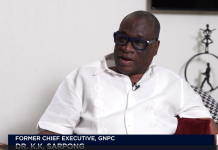The International Monetary Fund (IMF) has voiced strong concerns over rising global trade uncertainty, warning of significant challenges for countries exporting to the United States.
This follows the U.S. government’s recent decision to impose a 10% tariff on all its trading partners, including Ghana, and intensifying trade tensions with China, which has retaliated with steep tariffs of 125% and 145%.

Speaking at the 2025 World Bank Group/IMF Spring Meetings, IMF Managing Director Kristalina Georgieva highlighted the far-reaching implications of these developments, especially the inflationary pressure on product prices in affected economies.
“The complexity of modern supply chains means imported inputs are embedded in a wide range of domestic products. The cost of a single item can be influenced by tariffs in dozens of countries,” Georgieva said.
“In a world of fluctuating bilateral tariffs, business planning becomes extremely difficult. We’re seeing ships at sea unsure of which port to dock at. Investment and consumer decisions are being delayed.”
She warned that sustained uncertainty is not only disrupting global trade but also weighing heavily on financial markets and consumer confidence.
“Rising trade barriers impact growth immediately. Tariffs, much like taxes, may raise revenue, but they do so at the expense of reducing and redirecting economic activity,” she stated. “Past experience shows that the burden of higher tariffs isn’t borne solely by trading partners. Importers often absorb part of the cost through lower profits, and consumers ultimately pay more for goods.”
The IMF’s remarks add to mounting concern over the long-term implications of protectionist policies, with fears that continued escalation could erode global economic stability and stall recovery efforts in developing economies.























































![[FREE FREE MONEY] Predict and Win a Guaranteed GH¢200 From Us EVERY WEEK](https://wordpress.ghanatalksradio.com/wp-content/uploads/2022/02/Predict-and-Win-Final-09-03-2021-218x150.jpg)
![[Predict & Win – 8th/Oct.] WIN A Guaranteed ¢200 From Us This Week](https://wordpress.ghanatalksradio.com/wp-content/uploads/2021/10/maxresdefault-16-218x150.jpg)
![[Predict & Win – 2nd] WIN A Guaranteed ¢200 From Us This Week](https://wordpress.ghanatalksradio.com/wp-content/uploads/2021/09/maxresdefault-50-218x150.jpg)
![[Predict & Win – 25th] WIN A Guaranteed ¢200 From Us This Week](https://wordpress.ghanatalksradio.com/wp-content/uploads/2021/09/maxresdefault-36-218x150.jpg)
![[Predict & Win – 18th] WIN A Guaranteed ¢200 From Us This Week](https://wordpress.ghanatalksradio.com/wp-content/uploads/2021/09/maxresdefault-23-218x150.jpg)







![[National cathedral] See full list of churches that have contributed since 2018](https://wordpress.ghanatalksradio.com/wp-content/uploads/2020/09/Ghana-National-Cathedral-GhanaTalksRadio-100x70.jpg)
![[Guinea coup] Military bar all govt officials from traveling until further notice](https://wordpress.ghanatalksradio.com/wp-content/uploads/2021/09/XIOOYMK7N5NSPKTGXJTU6HAQLQ-100x70.jpg)


